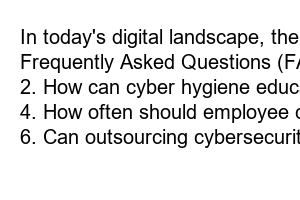세탁업 사이버 위생교육
Title: Cyber Hygiene Education: Safeguarding the Laundry Industry
Introduction:
With the increased reliance on digital solutions, the laundry industry has become an enticing target for cybercriminals. As technology evolves, **proper cyber hygiene education** has become an indispensable part of protecting the industry from data breaches, financial loss, and reputation damage. In this article, we will explore the importance of cyber hygiene education in the laundry industry and highlight key steps to enhance security.
1. The Rising Threat Landscape in the Laundry Industry:
Cyber threats continue to evolve rapidly, with laundry businesses becoming a prime target for cyberattacks. From customer data theft to ransomware attacks, **these malicious activities** can disrupt operations and harm the reputation of businesses. It is crucial for the industry to stay proactive and raise awareness about cyber hygiene practices.
2. Understanding Cyber Hygiene:
**An essential aspect of cybersecurity**, cyber hygiene refers to the implementation of good practices to maintain and enhance security. **It encompasses various measures** such as regular software updates, strong password management, data backup strategies, and educating employees about potential risks.
3. Educating Employees on Cyber Risks:
Ensuring that all employees are well-informed about cyber risks and preventative measures is paramount. By providing regular training sessions on identifying phishing attempts, safeguarding personal devices, and recognizing social engineering tactics, laundry businesses can create a robust first line of defense against cyber threats.
4. Implementing Robust Data Security Measures:
In the digital age, **data is an invaluable asset**. It is imperative for laundry businesses to invest in robust security measures like encryption, multifactor authentication, and secure networks to protect sensitive data from unauthorized access. Regular vulnerability assessments and penetration testing should also be carried out to identify and address any potential weaknesses.
5. Monitoring and Incident Response:
Constant monitoring and timely incident response are fundamental in mitigating the impact of cyberattacks. By implementing **advanced threat detection systems** and establishing incident response protocols, laundry businesses can minimize the time taken to identify and resolve potential security incidents, reducing the potential damage inflicted.
6. Partnering with Trusted Cybersecurity Providers:
Collaborating with reputable cybersecurity providers can further enhance the security posture of laundry businesses. These experts can assist in identifying vulnerabilities, creating tailored security frameworks, and offering guidance on industry best practices. **By outsourcing cybersecurity services**, laundry businesses can focus on what they do best while ensuring they have comprehensive protection against cyber threats.
Summary:
In today’s digital landscape, the laundry industry must prioritize cyber hygiene education to safeguard its operations, sensitive data, and reputation. Through employee education, robust data security measures, vigilant monitoring, and collaboration with cybersecurity professionals, laundry businesses can significantly reduce their vulnerability to cyberattacks. By adopting a proactive approach to cybersecurity, the industry can protect its customers, employees, and overall business interests from the ever-present threat of cybercrime.
Frequently Asked Questions (FAQs):
1. What is cyber hygiene?
2. How can cyber hygiene education benefit the laundry industry?
3. What are some common cyber threats faced by the laundry industry?
4. How often should employee cybersecurity training be conducted?
5. What are the key components of a robust incident response plan?
6. Can outsourcing cybersecurity services be beneficial for laundry businesses?

